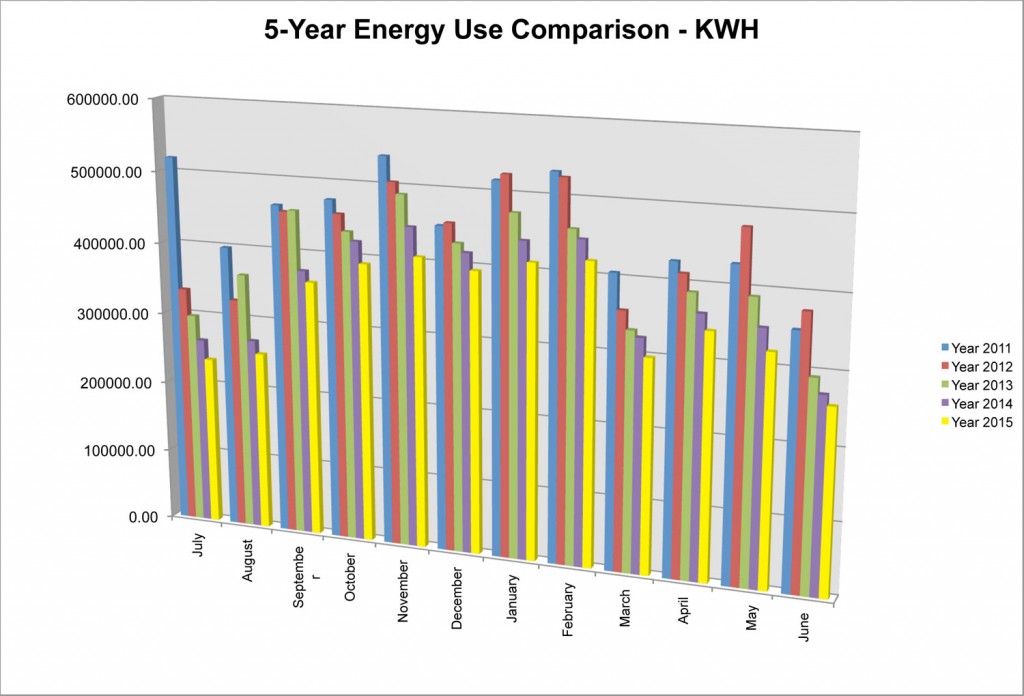Reducing Our Footprint
Over the past five years, Milton Academy’s facilities department, working with third party vendors, conducted energy audits and assessments of our buildings, energy usage, and waste management. These audits have led to numerous initiatives on campus to conserve energy, update older systems and follow best practices.
Energy
Electricity
- The energy initiative of replacing 4,812 light fixtures was completed in early winter 2013.
- Electric sub-meters are installed in all of the campus buildings. This provides the School with a snapshot of each building’s energy usage and allows us to efficiently deal with abnormal usage issues.
Heat and Air Conditioning
- In 2013, the heating system in Goodwin House was converted from an oil boiler to a gas high efficient boiler for both heat and hot water.
- During the 2013-2014 school year, three faculty houses switched from oil to gas heating.
-
In 2006 and 2012, the Heating Ventilation and Air Conditioning (HVAC) units underwent an audit by energy consultants to help us determine ways in which to save energy and increase efficiency. As Milton upgrades campus buildings, modern HVAC automated controls are installed. These controls allow us to provide better climate control and to switch between occupied and unoccupied modes more efficiently.
-
In the central heating plant, two of the three boilers that produce steam to heat our buildings were converted from oil to gas.
Solar Power
Solar panels are now a prominent feature on the Milton campus horizon. Photovoltaic solar panels are installed on the two, south facing gable roofs of the Athletic and Convocation Center (ACC). The ACC is the largest building on campus, and the largest user of electricity. Photovoltaic panels generate electrical power by converting solar radiation into direct current electricity. On a sunny, summer day, the panels will produce 900-kilowatt hours of useful electricity. This will provide about 50 percent of the electricity load for the ACC when the hockey rink is not in service. The estimated savings for Milton in electricity costs over a 20-year period is over $400,000.
The Athletic Center is the second campus building to use solar power. The Pritzker Science Center uses electricity generated from both hot water and photovoltaic panels installed on the roof.
The link below is a live solar panel metering dashboard for the ACC:
http://solar.myenergypro.com/MiltonAcademy/MiltonAcademy/Kiosk
Water
Our Drinking Water
Milton encourages limited bottled water on campus. Water fountains retrofitted with spigots allow for easy filling of reusable mugs and bottles with filtered tap water. FLIK Dining Services uses water pitchers and dispensers at catering events on campus.
Our Ground Water
The School has converted from Town of Milton water to well water, which is drawn from three wells located on campus. This water is used for all needs, including grounds upkeep, heating systems, and other general use.
Recycling
Our Recycling Program
Milton Academy has a single-stream recycling program that includes mixed paper, bottles, cans and cardboard. Residential houses, hallways, common areas, kitchens, laundry rooms and computer centers are equipped with recycling containers. Many exterior high-traffic areas, including the Cox Library quad, Robert Saltonstall Gymnasium, van and bus pick-up/drop-off areas and athletic fields are equipped with recycling containers, as well.
All members of the community are expected to participate in the School’s recycling program and comply with the following guidelines:
- Boarding students should sort waste from their rooms into trash and recycling containers in their halls, and recycle in the kitchens, laundry and computer areas.
- Students, staff and faculty should use recycling containers in high-traffic designated locations across campus.
- Trash should not be thrown into recycling containers, as it contaminates the material in those containers that then must be disposed of as trash.
- All recycled items must be empty, and plastic plates should be wiped clean before they are put into a recycling container.
- Use disposable containers from dining halls only for take-out.
Waste Facts
- Facilities replaced all paper towel dispensers and soap dispensers with energy efficient dispensers using recycled papers.
- Milton Academy purchases “green” housekeeping products where possible, including toilet and hand tissue made from recycled materials. Copy paper contains between 10 and 30 percent post-consumer recycled paper.
- Academy Technology Services has created numerous Web-based processes and applications that have reduced the need for paper, including the placement test for modern language, course registration, reenrollment and attendance.
- All major printers are set to double-sided printing to reduce the amount of paper used. Using centrally-located printers rather than small printers has saved on ink and created less waste.
- Academy Technology Services works with agencies to redistribute the School’s used computers, including sending the equipment to developing countries.

